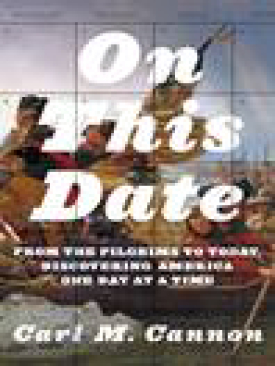Have you ever heard of S.R. Ranganathan? He was a mathematician and librarian from India who developed what are known as the Five Laws of Library Science. These laws, first proposed by Dr. Ranganathan in 1931, are still relevant nearly 90 years later and continue to be embraced by librarians worldwide. Here are the Five Laws:
• Books are for use.
• Every reader his/her book.
• Every book its reader.
• Save the time of the reader.
• The library is a growing organism.
I bring up Ranganathan’s Five Laws because the second and third laws run around my head every time I write this column. Those of us who work in the Collection Development department always hope that every book (or audio book, DVD, e-book, etc.) we purchase will find its reader, and conversely, that every reader who visits the library will find his/her book. Today’s Check It Out book is a personal success story because “On This Date” by Carl M. Cannon is right up my alley. Book, shake hands with reader. Reader, shake hands with book. Nice to meet you.
“On This Date” is a good match for me because I’m a “what-happened-on-this-day-in-history” kind of a girl. And I’m hoping that someone else feels the same way. For each day of the year, Cannon crafts a short story culled from the annals of American history. It’s a compelling collection of notable events, people, and places, and it’s a unique way to experience random but fascinating pieces of history covering a span of over 500 years.
For today’s date, Nov. 12, Cannon focuses on Elizabeth Cady Stanton, the American suffragist leader, who was born on this day in 1815. The story shares Elizabeth’s memory of her father’s grief over losing all three of his sons. She was only 11 when her third brother died, and she recalls her father saying to her on the day of the funeral, “Oh, my daughter, I wish you were a boy!” It wasn’t a rebuke but rather a father’s lament for his lost son and his daughter’s place in a world so indifferent to the rights of women. Elizabeth promised her father that day that she would “try to be all my brother was,” and her crusade for women’s rights fulfilled that promise and so much more.



